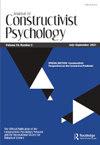意义六重奏:系统的文献回顾和对生活意义的普遍类型学的进一步验证
IF 0.7
4区 心理学
Q3 PSYCHOLOGY, CLINICAL
引用次数: 2
摘要
许多研究人员都在问,人们在生活中经历过什么是有意义的、有价值的、有目的的或重要的。然而,关于意义的世界范围的类型学似乎没有达成共识。该项目旨在确定经验文献中生活意义的全面普遍类型,并为这种类型找到额外的支持。研究1包括对所有关于生活意义的研究进行系统的文献综述,通过主题分析来确定意义的类型和子类型。研究2从概念上将这些发现与其他已发表的意义类型学进行了比较。研究3在“意义六重奏问卷”(MSQ)中对这种类型进行了操作。MSQ采用顺序混合方法研究设计,包括项目开发、三步测试-访谈、非正式可行性研究和正式调查的子研究。文献综述在涉及45710名参与者的107项研究中确定了6种类型和29种亚类型的意义,并整合和扩展了其他已发表的类型:物质主义意义类型(物质条件、专业教育成功)、享乐主义意义类型(享乐主义/具体化经验)、自我导向意义类型(弹性、自我效能、自我接纳、自主性、创造性自我表达、自我照顾)、社会意义类型(社会联系、归属感、因循守规、利他主义和儿童)、更大意义类型(目的、个人成长、时间性、正义/伦理和灵性/宗教)、存在哲学意义类型(活着、独特、自由、自由)、感恩,负责)。MSQ在49个国家的1281名参与者中证实了这一意义六元组的普遍性,其因素结构和相关性与其他问卷的预期一致。物质主义、享乐主义和自我导向意义与低心理幸福感相关,而社会意义和更大意义与高心理幸福感相关。总之,意义六重奏似乎是一种全面有效的生活意义类型,可用于心理治疗,咨询,指导和教育。本文章由计算机程序翻译,如有差异,请以英文原文为准。
The Meaning Sextet: A Systematic Literature Review and Further Validation of a Universal Typology of Meaning in Life
Abstract Many researchers have asked what individuals experience as meaningful, valuable, purposeful, or important in life. However, there seems little consensus about a world-wide typology of meaning. This project aimed to identify a comprehensive universal typology of meaning in life in the empirical literature, and to find additional support for this typology. Study 1 included a systematic literature review on all studies on meaning in life, to identify types and sub-types of meaning via thematic analysis. Study 2 conceptually compared these findings with other published meaning typologies. Study 3 operationalized this typology in the “Meaning Sextet Questionnaire” (MSQ). The MSQ was developed in a sequential mixed-methods study design, consisting of the sub-studies of Item-development, Three-Step-Test-Interview, an informal feasibility study and a formal survey. The literature review identified 6 types and 29 sub-types of meaning in 107 studies in 45.710 participants, which integrated and extended other published typologies: materialistic types of meaning (material conditions, professional-educational success), hedonistic types (hedonistic/embodied experiences), self-oriented types (resilience, self-efficacy, self-acceptance, autonomy, creative self-expression, self-care), social types (social connections, belonging, conformism, altruism, and children), larger types (purposes, personal growth, temporality, justice/ethics, and spirituality/religion), existential-philosophical types (being-alive, unique, free, grateful, and responsible). The MSQ confirmed the universality of this meaning sextet in 1281 participants in 49 countries, with factor-structure and correlations as expected with other questionnaires. Materialistic, hedonistic, and self-oriented meanings correlate with low psychological well-being, and social and larger meanings with large psychological well-being. In sum, the meaning sextet seems to be a comprehensive valid typology of meaning in life which may be used in psychological therapies, counseling, coaching and education.
求助全文
通过发布文献求助,成功后即可免费获取论文全文。
去求助
来源期刊

Journal of Constructivist Psychology
PSYCHOLOGY, CLINICAL-
CiteScore
2.40
自引率
0.00%
发文量
22
期刊介绍:
Psychology and related disciplines throughout the human sciences and humanities have been revolutionized by a postmodern emphasis on the role of language, human systems, and personal knowledge in the construction of social realities. The Journal of Constructivist Psychology is the first publication to provide a professional forum for this emerging focus, embracing such diverse expressions of constructivism as personal construct theory, constructivist marriage and family therapy, structural-developmental and language-based approaches to psychology, and narrative psychology.
 求助内容:
求助内容: 应助结果提醒方式:
应助结果提醒方式:


